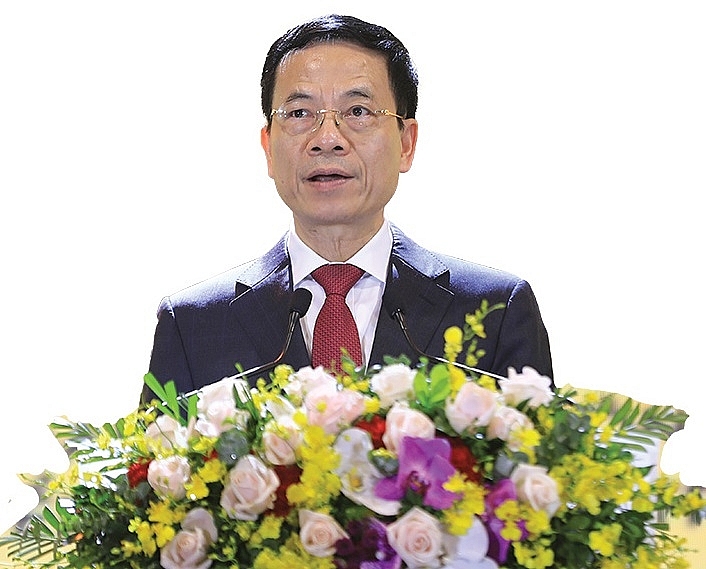Make in Vietnam, by Vietnam for a fresh digital orientation
 |
| Nguyen Manh Hung, Minister of Information and Communications |
Each revolution enables just five or six countries to evolve into developed ones, and the Fourth Industrial Revolution will only provide the opportunity for a few pioneering nations.
Without Vietnamese-made products and platforms, Vietnam will struggle to become a developed nation of prosperity, and would find it difficult to venture further into the international market.
One year ago, at the first national forum on the development of Vietnamese digital technology enterprises, a song about the pride of Vietnam rang out with a performance of 100 actors and actresses from different regions and ethnicities. The subsequent launch of the Make in Vietnam programme reflected the country’s pride and aspirations.
After one year, over 13,000 digital technology businesses were established, up 28 per cent on-year, resulting in a record number of such enterprises, with more than 58,000.
A year ago, we believed the highest number of new digital businesses would be around 6,000 annually, showing that we comprehensively underestimated the strength of the Vietnamese people. The target of having 100,000 digital businesses by 2030 is now more feasible and we are likely to obtain it by 2025.
“Make in Vietnam” is a slogan of action and promotes the spirit of design, innovation, and production in Vietnam. Instead of just assembling, production is encouraged to help solve the problems of Vietnam itself and aid export to other international markets.
We heard and told far more about international stories to Vietnamese people. It is time to tell Vietnamese stories. Every Vietnamese person and each Vietnamese business should join the Make in Vietnam programme and tell their own stories to encourage others to do so.
We have seen a strong increase in the development of digital products during COVID-19 from Ncovi, Bluezone, and CoMeet to online education platforms, telemedicine, remote medical consultation, remote accounting platforms, and others – and Vietnam is among the countries taking the lead in development of digital platforms during the pandemic.
Achieving a high level of proficiency in cybersecurity to protect Vietnam’s interests in cyberspace is also a focus of the Make in Vietnam programme. During 2020, the initiative has encouraged and prompted Vietnamese cybersecurity businesses to master up to 90 per cent of the ecosystem of Vietnamese network security products.
Meanwhile, Vietnam became the fifth country in the world to pilot 5G technology, and produce 5G infrastructure devices and 5G-enabled smartphones. Few people believed that Vietnam could do this. Technological advancements are not unattainable – they are the result of innovation and creativity.
The prime minister in June issued the National Digital Transformation Programme, outlining Vietnam’s road to digital transformation – a path that will take decades. Therefore, the Make in Vietnam programme needs a long-term vision and strategies for each development period.
At the Vietnam Open Summit held in November 2020, the consensus was to base Vietnam’s advancement on open technology. Choosing open-source technology for Vietnam’s development combined with an open approach to data would enable individuals and businesses to join the creation of new values is the country’s orientation.
With this orientation, Vietnam aims to grow into a digital country, developing a firmer grasp on the knowledge of mankind and also contributing to human knowledge.
The strategy to develop Vietnamese digital technology businesses and a set of measurement indicators will guide our way.
The annual Viet Solutions contest – a national award for digital products – will be particularly useful to speed us along the journey. The competition will create a platform and motivation for Vietnamese technology developers to come up with useful solutions specifically tailored for the country’s digital transformation.
Looking towards 2021, it is expected to be a year of strong development for Vietnamese digital technology businesses, and a year of more plentiful products and platforms through the Make in Vietnam initiative.
What the stars mean:
★ Poor ★ ★ Promising ★★★ Good ★★★★ Very good ★★★★★ Exceptional
Themes: Digital Transformation
- PM sets five key tasks to accelerate sci-tech development
- Ho Chi Minh City launches plan for innovation and digital transformation
- Dassault Systèmes and Nvidia to build platform powering virtual twins
- Sci-tech sector sees January revenue growth of 23 per cent
- Advanced semiconductor testing and packaging plant to become operational in 2027
Related Contents
Latest News
More News
- Spring Fair 2026 boosts domestic demand (March 02, 2026 | 16:30)
- Law on Investment takes effect (March 02, 2026 | 16:21)
- Ho Chi Minh City attracts nearly $980 million in FDI in early 2026 (March 02, 2026 | 10:57)
- Businesses bouncing back after turbulent year (February 27, 2026 | 16:42)
- VinaCapital launches Vietnam's first two strategic-beta ETFs (February 26, 2026 | 09:00)
- PM sets five key tasks to accelerate sci-tech development (February 26, 2026 | 08:00)
- PM outlines new tasks for healthcare sector (February 25, 2026 | 16:00)
- Citi report finds global trade transformed by tariffs and AI (February 25, 2026 | 10:49)
- Vietnam sets ambitious dairy growth targets (February 24, 2026 | 18:00)
- Vietnam, New Zealand seek level-up in ties (February 19, 2026 | 18:06)

 Tag:
Tag:




















 Mobile Version
Mobile Version